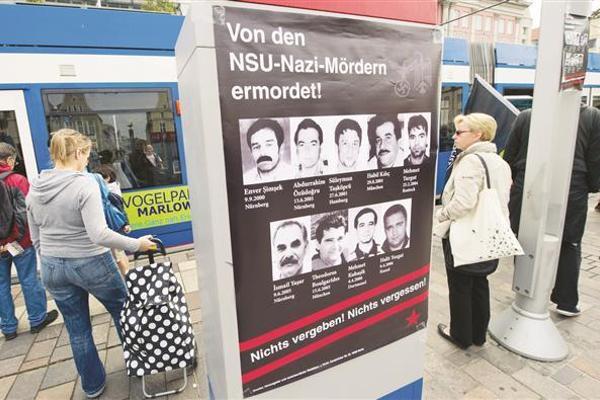New wave of neo-Nazis presents greater threat
DORTMUND - Reuters


A placard showing the nine victims of the neo-Nazi group, eight Turks, one Greek, is exhibited at a rally commemorating the xenophobic riots in Rostock, Germany. EPA photo
Germany’s neo-Nazis are hanging up their bomber jackets, unlacing their black leather boots and even grabbing a bite to eat at their local Turkish kebab shop. Eschewing their predecessors’ fierce aversion to anything “un-German,” they blend into the local community and easily escape detection. But police and experts say this new generation of young fascists is potentially far more dangerous and reckless than their older peers.“Today a neo-Nazi can eat Turkish kebabs and still go out and beat up immigrants,” said journalist Johannes Radke, who has reported on the German far-right for more than a decade. “They say, ‘We’ll let everyone do whatever they want as long as they’re a Nazi at heart.’”
Headquartered in the down-at-heel western industrial city of Dortmund, a new group known as the Autonomous Nationalists (AN) is at the forefront of this transformation.
They share the hard-core xenophobia of older cadres in the far-right, but their appearance and tactics are those of a dynamic, Internet-savvy youth movement. They wear stylish running shoes and expensive brand name windbreakers and communicate with each other via Twitter. The use of English slogans at protests, for decades taboo in far-right circles, is widespread.
Avant-garde of Nazi scene
“They see themselves as the avant-garde of the Nazi scene,” Radke said. “They’re much more professional than some drunk, dim-witted skinhead, and more dangerous.”
Authorities and residents across Germany have become more sensitive to the threat of far-right militants since revelations last year that a neo-Nazi cell waged a seven-year racist killing spree throughout the country, murdering nine people, eight of them ethnic Turks, one of them in Dortmund. The cell’s existence only came to light by chance after two members committed suicide following a botched bank robbery. The murders forced an overhaul of Germany’s intelligence services.
“Many Nazis moved here because they thought this was a broken city,” Dortmund mayor Ullrich Sierau told Reuters, adding that extremists exploited the fact the city of half a million has one of the highest unemployment rates in the region.
Dortmund’s new police chief Norbert Wesseler said there were 131 crimes tied to far-right militants including violent assaults in the city in the first half of the year. “The number of offences has risen considerably over earlier years,” he added, without giving comparative figures.
A former neo-Nazi from eastern Germany, who has since left the scene, spoke to Reuters on condition of anonymity for fear of reprisals, saying new recruits find that the Autonomous Nationalists are a restless bunch, always plotting their next move.
“When you’re in that scene, it’s like you’re living in a parallel universe to normal society,” said the 25-year-old. The neo-Nazis methodically prepare their attacks against anyone who opposes their radical views, he said. Much of the work they do mirrors that of private investigators: researching targets, staking out locations and taking pictures of opponents to match faces to names.
Many do not work, living off welfare from a democratic state they vehemently oppose as well as donations from sympathetic outsiders. “They are also able to secure weapons through contacts in other countries, such as Bulgaria or Switzerland,” he said. “If you need something, it’s possible for them to get it across the border.”
